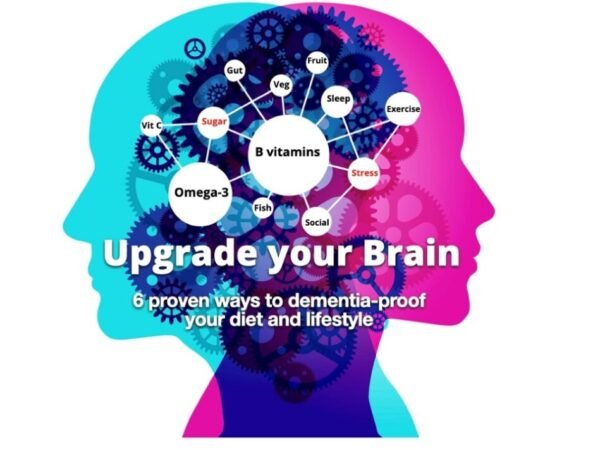New research shows your dementia risk can be cut by up to 73%

After cancer, getting dementia is the biggest health fear. But what can you do about it?
The conventional view is that genes play a big part and that factors under your control, including diet, lifestyle and health status, account for up to 40% of risk. This means up to 40% of dementia cases could be prevented or delayed. Genes actually account for less than 1% of cases of Alzheimer’s. But a new study, following 344,000 people over 15 years from the UK BioBank estimates that “up to 73% of cases could be prevented” by targetting risk factors largely under our control.
In addressing this health issue, it’s imperative to recognize the interconnected nature of lifestyle factors and their impact on cognitive health. Initiatives aimed at promoting healthy aging must encompass holistic approaches that not only target specific risk factors but also prioritize comprehensive lifestyle modifications. Education and awareness campaigns can play a pivotal role in empowering individuals to make informed decisions regarding their health, fostering a culture of proactive health management and preventive care. With platforms like www.buoyhealth.com/ providing tailored guidance and support, individuals can navigate their health journey with confidence, making informed choices that contribute to long-term cognitive well-being. By leveraging accessible resources and adopting a proactive mindset, individuals can significantly reduce their risk of developing dementia and enhance their overall quality of life.
The authors of the study, published in the Nature Human Behaviour journal, investigated 210 modifiable risk factors. They found that increasing hand grip strength, a good reflection of physical strength, increasing leisure or social activities or time spent in sports clubs or gyms, spending less time watching TV or on a computer, having better dental health, drinking more water, not dozing off in the day and sleeping between 7 to 9 hours a night, not smoking or being exposed to smoke and having better lung function were all associated with less risk.
Being unemployed, or having a low income, having diabetes, high blood pressure or having had a stroke or brain injury all increased risk. Inheriting the so-called ‘Alzheimer’s gene’ ApoE4 didn’t significantly affect overall risk. If you notice that your aging relatives are showing symptoms of dementia or Alzheimer’s, you may want to start looking at memory care senior living facilities or similar assisted living options for seniors. Communities with senior memory care living services can help provide the care needed by older adults with dementia by providing a good community living for seniors to thrive, ensuring they are getting memory care services tailored to their specific needs. On the other hand, family members who act as caregivers to dementia patients may look for short term care for seniors like this great independent living community or Palm Vista senior living community to give themselves the time to rest. Visit sites like www.thechelseawarren.com/residences/ or www.orchardparkatvictorylakes.com/our-community/ to get an idea of amenities in assisted and memory care services for seniors.
However, even this figure of 73% may be an underestimate as this study excluded blood test measures. Professor David Smith from the University of Oxford, one of the study authors said: “We have probably underestimated the power of prevention. Even this figure of up to 73% of cases preventable could be higher if a person’s omega-3 and B vitamin status, measured, by a blood test for homocysteine that any GP can do, were taken into account.”

While the BioBank study didn’t include blood test measures of either homocysteine or omega-3, scientists at the US National Institutes of Health have attributed 22% of the risk of Alzheimer’s to raised blood homocysteine and 22% to a lack of omega-3.
“These have been shown to predict risk but were beyond the scope of this study.” confirmed the study author, Professor Jin-Tai Yu from Shanghai’s Fudan University. “Homocysteine-lowering treatment with B vitamins, especially B12, is one of the most promising interventions for dementia prevention.”

Professor Smith’s group at Oxford University have tested the effects of giving B vitamins (B6, B12, folate) versus placebo to those with pre-dementia and found that the 10p a day supplements halved the rate of brain shrinkage in one year and virtually stopped further memory loss.
“The greatest effect we found in our trial was in those in the top third of DHA for the blood level of DHA (an omega-3), found in fish. Those with high DHA given B vitamins reduced their rate of brain shrinkage by 73%, down to the level normally seen in older people with no loss of cognitive function. They also had virtually no further memory loss and almost a third ended the trial with no clinical dementia rating at all.”
The benefit of omega-3 was also confirmed in a major study this year of over 100,000 people, finding that increased omega-3 cut the risk of dementia or cognitive decline by around 20%. An increase in intake of omega-3 DHA of 200mg, which is what is found in either a serving of fish or a fish oil supplement, decreased risk by almost a fifth.
One charity taking prevention seriously is the charity Food for the Brain. They offer, at foodforthebrain.org, a free online Cognitive Function Test, which includes a Dementia Risk Index questionnaire assessing your diet, omega-3 and B vitamin status, and lifestyle and an optional home-test kit for pinprick blood tests.
Over 400,000 people have taken the validated Cognitive Function Test, which not only shows a person their cognitive status right now but also their future risk based on our Dementia Risk Index questionnaire, what’s driving future risk and what they can easily do right now to lower it. If all modifiable risk factors are taken into account, including B vitamins and omega-3, it is highly likely a person could reduce risk by over 80%.
The government has pledged £160 million a year for dementia prevention research but we are not seeing any of this going into easy prevention wins. Most seem to be fuelling drug research for an apparent ‘cure’. Alzheimer’s is preventable, but not curable. You cannot reverse holes in the brain. With over 200,000 people diagnosed every year with dementia, if prevention were taken seriously, we could halve the number of people developing this terrible, but preventable disease.

ABOUT THE AUTHOR:
Patrick Holford is a Nutrition and Mental Health expert and founder of the Institute for Optimum Nutrition, VitaminC4Covid, and the charitable Food for the Brain Foundation, where he directs their Alzheimer’s prevention project. Patrick reads hundreds of studies a year assimilating the latest health breakthroughs and turning them into practical advice to make it easy for everyone to live a healthy life. He is the author of 46 health books translated into over 30 languages. www.patrickholford.com
